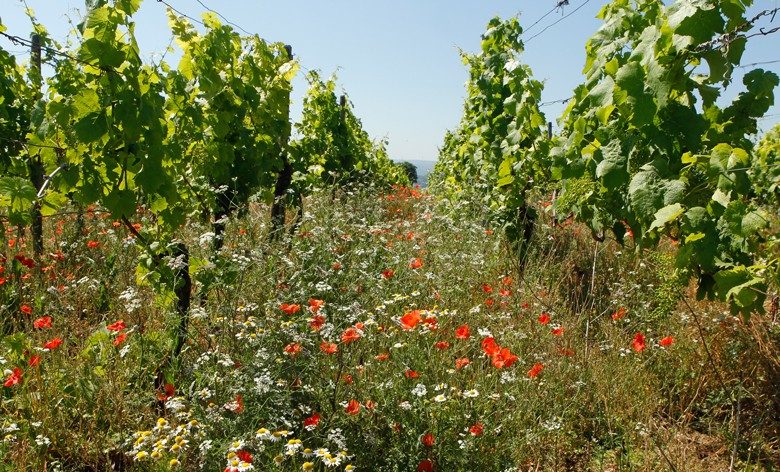Winery Galler, organic winery in Kirchheim an der Weinstraße
https://www.bonvinitas.com/media/reviews/photos/thumbnail/780x480c/d1/7b/02/weingut-galler-bio-weingut-in-kirchheim-an-der-weinstrasse-6-1748181148.jpgPIWI Varieties (fungus-resistant) – the Future of Viticulture
Unfortunately, our well-known grape varieties cannot defend themselves against the two very aggressive mildew fungal pests, oidium and peronospora, which were introduced from the New World back in the 19th century. These fungi heavily attack the leaves and developing grapes, forming mats as early as flowering time. This often leads to a ruined harvest and damage to the vine itself. Thus, there is no alternative but multiple intensive pest control treatments, often using strong chemical agents. However, since there are native, sometimes wild, grapevines in the New World that apparently resist the fungi — otherwise these vines would have long disappeared — the idea emerged to crossbreed such "powerhouse" vines with our varieties to combine their resistance with our good wine qualities. This has been successfully achieved multiple times: so-called PIWI varieties — the future of viticulture.
Ansgar and Katja Galler – PIWI Pioneers
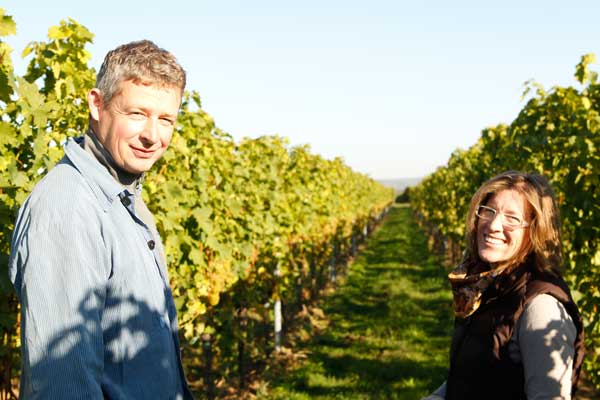 Weingut Galler, Ansgar and Katja Galler. Photo: Andreas Durst The Galler winery covers 11 hectares, which the Galler couple took over from others in 2009. It is a member of “Bioland” and has been certified organic since 2017. But that is by no means all, because even in an organic winery, our popular grape varieties do not automatically become more resistant — although certain practices, like maintaining a colorful vineyard (keyword: biodiversity), might help somewhat. At the Gallers, this is already standard. So they turned their focus to PIWI varieties. As early as 2014, they planted Sauvignac and Muscaris, which they now cultivate on 1.7 and 0.75 hectares respectively. In addition, they grow one hectare of Johanniter and other PIWI varieties, as well as classic grapes like Riesling, Pinot Blanc, and Dornfelder. Katja Galler: “For our PIWI varieties, two pest control treatments per year are often sufficient — something that, unfortunately, is far from enough for the classic varieties.”
Weingut Galler, Ansgar and Katja Galler. Photo: Andreas Durst The Galler winery covers 11 hectares, which the Galler couple took over from others in 2009. It is a member of “Bioland” and has been certified organic since 2017. But that is by no means all, because even in an organic winery, our popular grape varieties do not automatically become more resistant — although certain practices, like maintaining a colorful vineyard (keyword: biodiversity), might help somewhat. At the Gallers, this is already standard. So they turned their focus to PIWI varieties. As early as 2014, they planted Sauvignac and Muscaris, which they now cultivate on 1.7 and 0.75 hectares respectively. In addition, they grow one hectare of Johanniter and other PIWI varieties, as well as classic grapes like Riesling, Pinot Blanc, and Dornfelder. Katja Galler: “For our PIWI varieties, two pest control treatments per year are often sufficient — something that, unfortunately, is far from enough for the classic varieties.”
Sauvignac, Muscaris, and Johanniter
Sauvignac was bred in 2014 by Swiss grape breeder Valentin Blatter from Sauvignon, Riesling, and an undisclosed fungus-resistant vine. It was further selected by the Freytag nursery in Neustadt an der Weinstraße and is approved for experimental cultivation. Muscaris was created in 1987 at the State Viticulture Institute in Freiburg through a cross between Solaris (also a PIWI variety) and Yellow Muscat, and has been officially approved for commercial wine production since 2013. Johanniter is an older PIWI variety, bred back in 1968 at the same institute from Riesling and another PIWI variety, and has been approved since 2001. All three varieties exhibit good to very good resistance to the mentioned fungi. Katja: “PIWI vines are still being further developed and selected. We've planted a completely new generation of Muscaris that requires no pest control at all.”
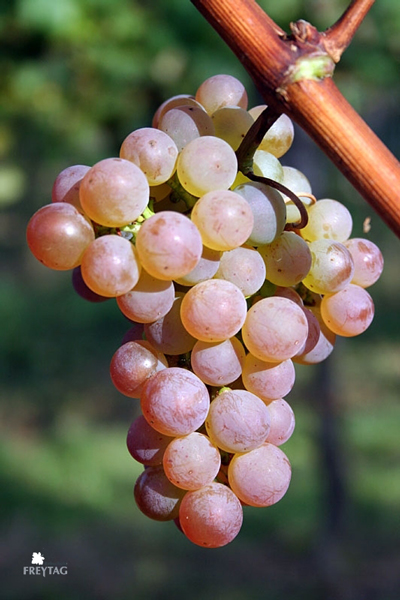 Sauvignac. Photo: Rebschule Freytag
Sauvignac. Photo: Rebschule Freytag 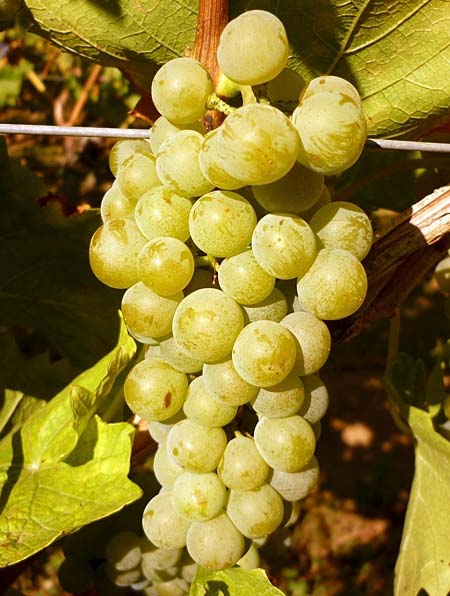 Muscaris. Photo: Rebschule Freytag
Muscaris. Photo: Rebschule Freytag 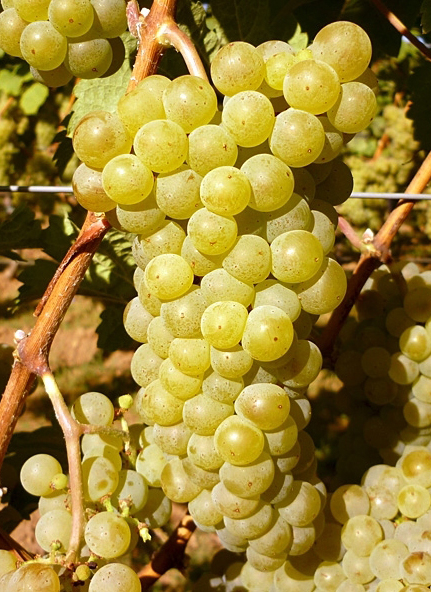 Johanniter. Photo: Rebschule Freytag
Johanniter. Photo: Rebschule Freytag Of Course, Plenty of Nature in the Cellar Too
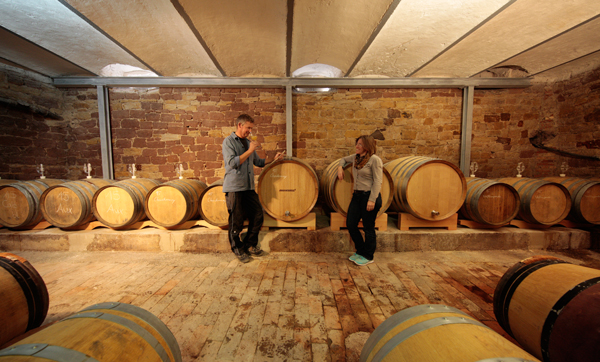 Weingut Galler, Ansgar and Katja Galler. Photo: Andreas Durst “Our wines are a natural product — the human only plays a supporting role,” is their philosophy. Thus, Ansgar, who is responsible for viticulture and the cellar, allows the wines to ferment spontaneously — that is, naturally and on their own. Added cultured yeasts are not used. A long lees aging is a matter of course, and the premium wines mature in used barriques. Katja adds: “All our wines are varietal — nothing is blended.”
Weingut Galler, Ansgar and Katja Galler. Photo: Andreas Durst “Our wines are a natural product — the human only plays a supporting role,” is their philosophy. Thus, Ansgar, who is responsible for viticulture and the cellar, allows the wines to ferment spontaneously — that is, naturally and on their own. Added cultured yeasts are not used. A long lees aging is a matter of course, and the premium wines mature in used barriques. Katja adds: “All our wines are varietal — nothing is blended.”
The winery, located in Kirchheim, lies in the Leininger Land region. The Gallers name their wines after the first names of the once-famous noble family of Leiningen.
Text: Dieter Simon, Editor-in-Chief and Publisher of bonvinitas. Photos: as indicated
